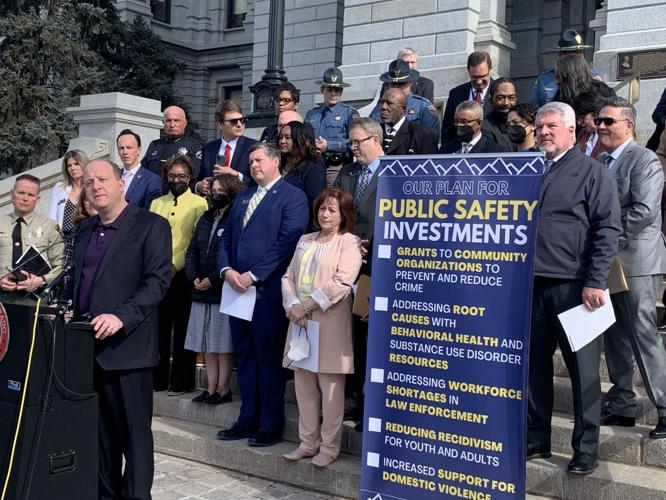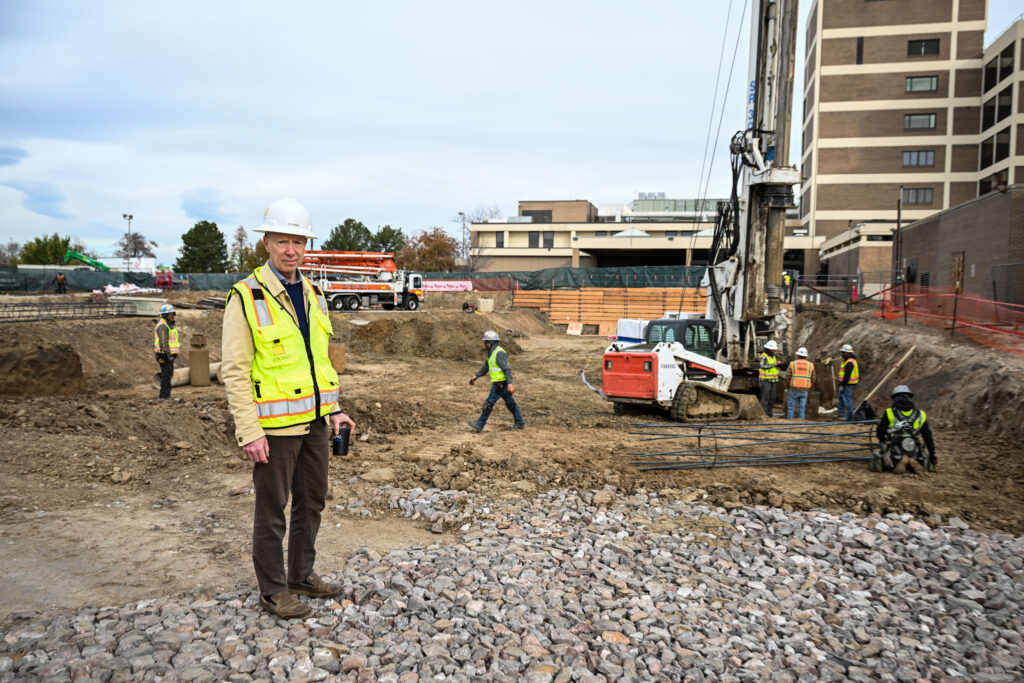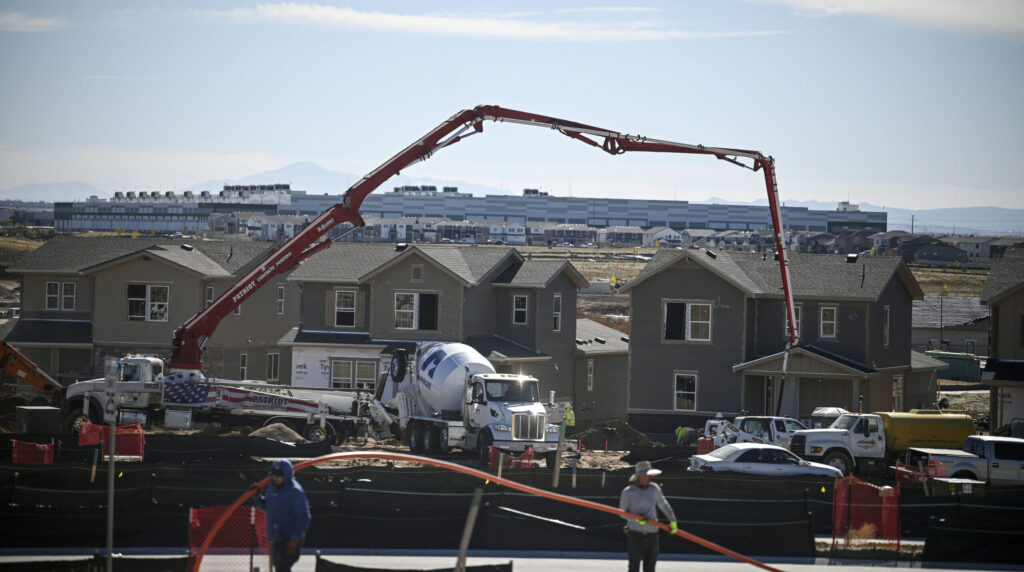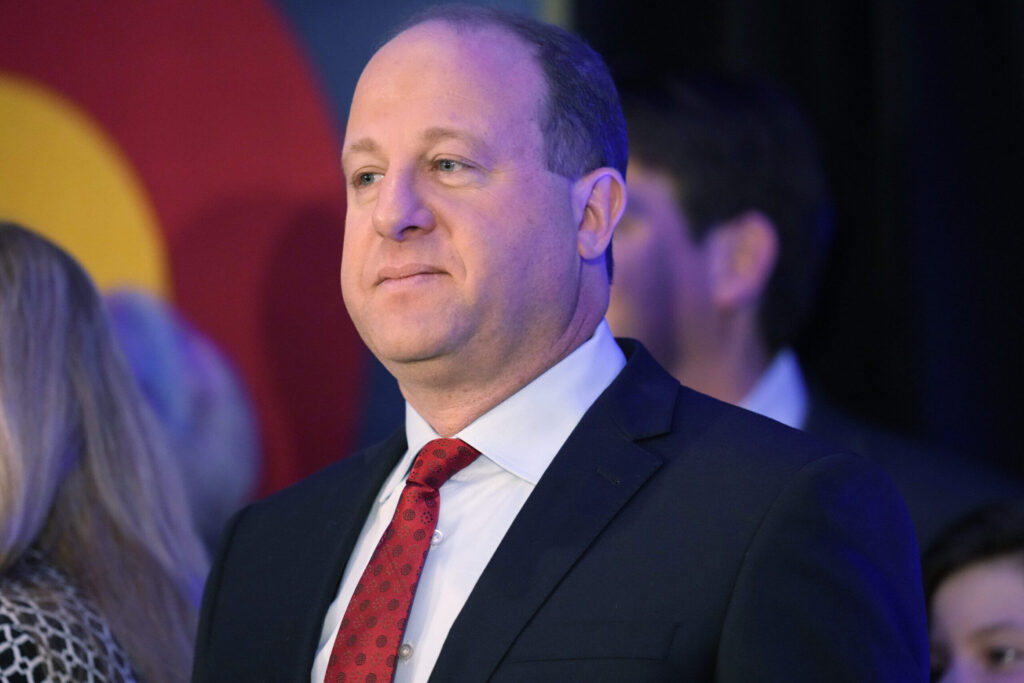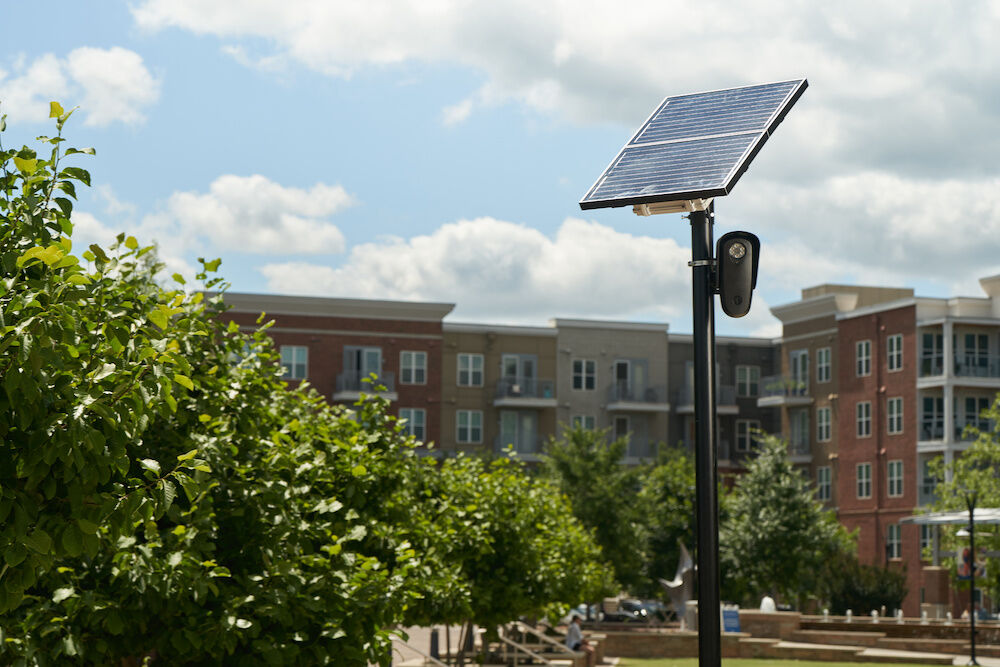Gov. Jared Polis, lawmakers, law enforcement officials announce public safety bill package
Gov. Jared Polis on Thursday unveiled a $113 million public safety package designed to take Colorado from the middle of the pack to one of the top states in the nation for public safety.
Ahead of the package’s rollout at a Thursday state Capitol news conference, Polis in a Wednesday interview told Colorado Politics his legislative solution is a two-year proposal, which he aims to have funded with one-time federal American Rescue Plan Act dollars. He’s hoping that should some or all of those programs prove successful, there will be an interest in longer-term funding, with an eye on a a five-year goal to move Colorado into the list of top 10 safest states.
“We know that evidence-based decisions on grants are very helpful in addressing public safety issues,” Polis said.
The package includes several items already in front of lawmakers. Those include a request from Polis to add 107 full-time employees to the Colorado Bureau of Investigation as part of his 2022-23 submission to the Joint Budget Committee, and Senate Bill 1, a measure sponsored by Sen. Janet Buckner, D-Aurora and Rep. Kerry Tipper, D-Lakewood, on addressing crime prevention through “safer street” design changes.
Stan Hilkey, executive director of the Colorado Department of Public Safety, said Wednesday that the intent is not to try to replicate mass incarceration activities. Instead the state is “trying to get ahead of things with prevention and treatment, and dealing with some of the social issues that cause people to become justice-involved.”
Hilkey explained CBI did a nationwide survey and found Colorado has the lowest number of state investigative officers per capita in the nation. Even with the 107 investigators Polis is proposing, Colorado’s national ranking would still sit at fourth from the bottom.
Currently, CBI has just 45 investigators in its forensics and investigative units. CBI is a “by request” agency, meaning they receive requests to help with cases and, for now, either say no or tell the requestor assistance could be delayed. That’s led to a backlog of work.
“We want to be able to say ‘yes’ more often,” Hilkey said.
The package also includes another bill already in the works: House Bill 1003, sponsored by Reps. Lindsey Dougherty, D-Arvada, and Serena Gonzales-Gutierrez, D-Denver.
The bill sets up a $2.1 million delinquency prevention and young offender intervention pilot grant program in the Division of Criminal Justice at DPS.
Several other provisions from the package have not been introduced yet but are set to come in the next week.
That includes a Buckner-backed bill, titled “Measures to Increase Community Safety,” which takes at least $24.5 million over two years to fund two or more grant programs within the Department of Public Safety. The grants will go to law enforcement and other local government agencies to identify high-crime areas. A second section deals with workforce recruitment, retention for law enforcement and tuition for the policy academy.
“We don’t have enough police officers right now,” Buckner told Colorado Politics.
That grant program is primarily targeted at recruiting police officers of color, and not just those who are Black or Latino. Buckner explained that her Aurora-based district has a high Asian-American population and she would like to see that community represented on the police force.
Sheriff Joe Pelle of Boulder County praised that proposal, noting recruiting and retainment efforts have recently been a “tremendous challenge,” both in Colorado and across the country.
“The governor’s proposal includes grants and aid to help with recruiting efforts, and to potentially help pay for community college police academy training for recruits who otherwise may not be able to afford it,” he said. “The sheriffs and chiefs who the governor met with to develop this strategy are very supportive and appreciative of this effort.”
Another bill from the package will resuscitate a grant program for schools to upgrade security procedures, such as door locks and video systems, and provide training to deal with active shooter situations. The bill from Sen. Chris Kolker, D-Centennial, also requires schools to coordinate more closely with law enforcement. The grant program, which mirrors one that was sunsetted a couple of years ago, will be funded with $2 million in federal dollars.
The package also includes a measure that borrows from the concepts from a pair of co-responder programs: Denver’s Support Team Assisted Response Program and Summit County’s System-wide Mental Assessment Response Team program, which both address 911 mental health calls. The STAR program sends paramedics and case workers to deal with nonviolent 911 calls instead of police. The SMART program pairs a police officer with a mental health counselor, who co-respond to mental health-related police calls.
Brian Mason, the district attorney for the 17th Judicial District (Adams and Broomfield counties) told Colorado Politics he’s very excited about a package that makes an historic investment in preventing crime as well as keeping people out of the criminal justice system.
“This invests in infrastructure, co-responder models, violence interruption, trauma screening for kids, and domestic violence programs,” all which he said will have a measurable impact on community safety.
Mason added he’s most excited about a bill from the package that investments in behavioral health.
That measure takes $47.9 million in federal ARPA money and directs it to a variety of behavioral health programs. According to the measure, it would fund criminal justice early-intervention programs to “prevent at-risk individuals from becoming involved, or further involved, in the criminal justice system, adding additional bed capacity to the Colorado Mental Health Institute at Fort Logan, and bolstering the state’s behavioral health workforce by offsetting loans, providing scholarships, and leveraging bonus payments in underserved communities.”
Mason noted 37% of federal and state prison inmates, and 44% of those in jails, report some type of mental health problem.
“This is a huge problem for us,” he said. “If we can address mental health problems before people turn to criminal activities,” that will impact the criminal justice system.
Much of the package is community-based, and that’s appealing to Rudy Gonzales of Servicios de la Raza. He told Colorado Politics he’s spent 13 years trying to bring in resources to help his community. The package “allows us and others like us to determine our own destiny, developing and implementing culturally responsible programming” that will lower crime and help with economic factors.
It also appeals to law enforcement and other officials.
Colorado Springs Mayor John Suthers in a statement said he viewed the package as “a step in the right direction.”
“Colorado has significant crime and public safety challenges, and while this legislative package won’t solve many of the challenges we face, it’s a step in the right direction. The pendulum needs to swing back to much greater emphasis on the safety and security of our citizens,” he said.
Chief of Police Blaine Hall of Montrose said he supports the package and Polis’ efforts to “bolster our recruiting, hiring, retention programs, and peace officer mental health support systems.” Hall said he also supports the additions for CBI, which he said has been investigating major crimes in Colorado communities with limited resources.
“The public safety bill package will benefit our law enforcement officers and Colorado communities in crime reduction moving forward,” Hall said.
Bishop Jerry Demmer, president of the Greater Metro Denver Ministerial Alliance, also weighed in to support the package.

Bishop Jerry Demmer of the Greater Metro Denver Ministerial Alliance, speaking in support of Gov. Jared Polis’ public safety legislation package, Feb. 10, 2022
“These funds will make an impact on the problems that plague communities of color,” he said. “Only a genuine partnership can solve the problems of violence and crime.”
The Colorado District Attorneys Council also met with the governor on the package. Suggestions from DAs in Mesa, Weld, Boulder and Jefferson counties identified priority areas, most of which made it into the package, according to Dan Rubenstein of the Mesa County-based 21st Judicial District.
“All of the components are improvements to our current public safety problems,” Rubenstein added.
Polis told reporters Thursday that he’s open to any idea on how to improve public safety, from the right or the left. But Sage Naumann, the spokesman for the Senate GOP, tweeted that Democrats would spend more money on electrification of school buses than for the public safety package. That’s $113 million for public safety and $150 million for school buses, he said in a later statement.
Democrats in Colorado are proposing more $$$ for electric school buses than they are public safety. Wow. #COpolitics
— 𝚂𝙰𝙶𝙴 𝚃𝙷𝙾𝙼𝙰𝚂 𝙽𝙰𝚄𝙼𝙰𝙽𝙽 (@SageNaumann) February 10, 2022
“This isn’t a priority for them, it’s a bullet point on their campaign mailers,” Naumann told Colorado Politics. “There are many good aspects of this plan that will inevitably draw bipartisan support, but there is a good reason that sheriffs, police chiefs and law enforcement officers refused to attend today.”
Dylan Mitchell, policy director for the House GOP caucus, tweeted that Democrats have been in control for the past three years, and “own the current crime wave sweeping our state. Coloradans will not forget at the ballot box this year.”
You’ve had full control of Colorado for 3+ years now. Democrats own the current crime wave sweeping our state. Coloradans will not forget at the ballot box this year. #copolitics #coleg https://t.co/OcM2i0vvij
— Dylan Mitchell (@DylanSMitchell) February 10, 2022
House Minority Leader Hugh McKean, R-Loveland, responded to the announcement, saying “while we realize that Governor Polis has noticed the soaring crime rate in our state, the desire to enact policy just months before an election does not go unnoticed by the voters. His plan still fails to address the policies that the General Assembly passed and that he signed into law. Those policies have softened penalties on criminals and hurt law enforcement agencies with increased restrictions and unfunded mandates, making it difficult for them to do their job.”
Republicans in the General Assembly have their own proposals for improving public safety.
Republican lawmakers roll out 44-bill package as part of Commitment to Colorado
While plenty of law enforcement and other government officials are supporting the package, the support isn’t unanimous.
The Colorado Association of Chiefs of Police, the Colorado Fraternal Order of Police and County Sheriffs of Colorado sent a letter to Polis prior to Thursday’s news conference, blaming the governor and Democratic-controlled legislature for “recent legislation and policy changes (that) have directly contributed to rising crime rates and struggles to recruit and retain officers.”
The letter said the organizations have not taken an official position on the package, citing “its failure to advance policy changes alongside ongoing budgetary proposals.”







